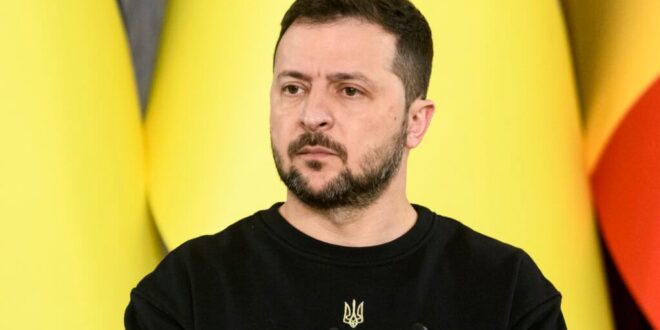The Ukrainian leader is right to say that if Putin wins, America loses
The meeting is scheduled to start at 6 PM so I arrive at the Ukrainian embassy ten minutes early. I’m ushered into a room that’s already filled with three dozen think tankers, opinion journalists, and other denizens of what we like to call the “foreign policy community.”
Volodymyr Zelensky has not made them wait.
Wearing his signature khaki shirt – his way of communicating that he’s a fulltime wartime leader – he’s energetically shaking hand after hand.
Is he really feeling so upbeat or is he drawing on his experience as a professional actor?
Ukrainian Ambassador Oksana Markarova asks everyone to take a seat at a long, rectangular table. Still standing, she welcomes her guests, then turns to President Zelensky, who is already sitting, and suggests he makes opening remarks.
“You’ve just done that,” he says. “Let’s talk.”
Though this get-together was not on the record, I don’t think I’m disclosing secrets when I tell you that Mr. Zelensky believes Ukrainians have made more progress in their defensive war than his critics acknowledge.
True, the recent Ukrainian counteroffensive failed to oust the Russian invaders from Donbas, a strip of eastern Ukraine, and from the northern coast of the Sea of Azov.
But the Ukrainians have prevented the Russians from seizing more territory, in the process, destroying nearly 90 percent of Russia’s prewar military machine, including much of Russia’s Black Sea fleet. Ukrainian grain is again being shipped to countries that need it.
This could not have been accomplished without American support and Mr. Zelensky is grateful.
But while that support has kept Ukrainians from losing, it hasn’t been sufficient to give them a serious chance of winning.
What would winning look like? Ideally, Ukrainians would reclaim every inch of their territory.
Failing that, Russian ruler Vladimir Putin would calculate that the price of conquering and subjugating Ukrainians is too high. He’d then seek the proverbial off-ramp.
Ukrainians are wary of “diplomatic solutions.” Among their reasons: In 1994, they gave up their nuclear weapons. In exchange, Russia signed the Budapest Memorandum pledging to “refrain from the threat or use of force against the territorial integrity or political independence of Ukraine.” Russia’s word is, obviously, not its bond.
In that same memo, the U.S. and Britain promised to “provide assistance…if Ukraine should become a victim of an act of aggression.”
Some Republicans now want to end that assistance. That would confirm Mr. Putin’s belief that Americans, sooner or later, will abandon Ukrainians, as Americans abandoned their Afghan allies in 2021.
The reasons some Republicans oppose assistance are various. A few are so delusional as to believe that Mr. Putin – an ex-KGB colonel allied with Communist China and Islamist Iran – is a defender of the Christian West.
Others are simply frightened of him.
“The United States isn’t going to risk World War III to guarantee Ukraine’s 1991 borders,” John Daniel Davidson, a senior editor at The Federalist wrote last week.
Would the United States risk World War III to guarantee that Taiwan is not swallowed by Chinese forces commanded by Xi Jinping? I suspect Mr. Xi will think that highly unlikely should the U.S. now give up on Ukraine.
Bolstering this analysis are President Biden’s relentless attempts to appease Iran’s rulers even as their proxies are attacking American outposts in the Middle East – more than 90 times over the last two months alone.
Simultaneously, the Houthis in Yemen, another client of Tehran, are attacking commercial ships in the Bab el-Mandeb Strait, one of the world’s most strategic waterways.
Speaking of strategy, back in 1990, President George H.W. Bush deployed American troops to force Saddam Hussein out of Kuwait. That was not because he regarded the emirate as a Jeffersonian democracy.
Rather, he recognized the strategic necessity of upholding the most fundamental rule of the international order established by the U.S. after World War II: Big, bully nations are not to gobble up smaller, weaker nations.
Ukrainians now, unlike Kuwaitis then, are not asking Americans to fight for them – only to give them the guns and bullets they need to defend their lands and independence.
Also unlike Kuwait, Ukraine is a fledgling democracy. The country’s last elections in 2019 were free and fair, as on-the-ground election observers – I was one of them – attested.
Has Ukrainian democracy been attenuated two years into a grueling existential war? Sure, but the same was true in America during the Civil War. Should Republicans therefore join the woke mobs toppling statues of Lincoln?
What about corruption? That’s a malady that afflicts many countries – the U.S. not excluded. South Korea was deeply corrupt after the U.S. fought a bloody war to prevent it from falling under the jackboot of a North Korean tyrant backed by Beijing and Moscow.
Worth noting: Mr. Zelensky has passed five new anti-corruption laws in the past six months.
Also relevant: Most of the money being spent on Ukraine is not being spent in Ukraine. It’s being spent in America on weapons made by Americans in American factories in at least 31 states. Those weapons are then replaced by new and more advanced versions for use by American forces.
That’s furthering what should be recognized as the urgent task of restoring America’s atrophied defense-industrial base at a time of increasing global disorder.
At the embassy meeting last week, Mr. Zelensky was adamant that Ukrainians will never submit to Mr. Putin, a wannabe czar espousing an anti-Western ideology.
Ukrainians, he made clear, aspire to become a full-fledged European nation – one willing and able to help defend the American-led Free World.
An America that turns its back on Ukraine will be seen as an America in steep decline. What America’s enemies will do then should not be difficult to imagine.
 Eurasia Press & News
Eurasia Press & News




